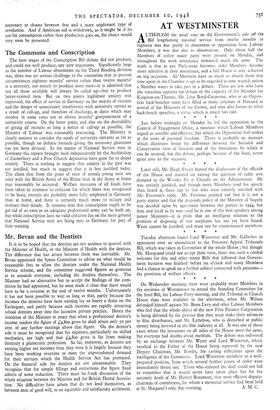AT WESTMINSTER
ALTHOUGH the small vote on the Government's side ott the Bill lengthening national service from twelve months to eighteen was due partly to abstention or opposition from Labour Members, it was due also to absenteeism. Only about half the
Members of either major party were present on Monday, and throughout the week attendance remained much the same. The truth is that as any Parliament becomes older Members become more selective in their attendance, and a full House is only achieved on big occasions. All Members have so much to absorb them that time spent in the Chamber is apt to be regarded as time wasted, unless a Member wants to take part in a debate. There are few who have the voracious appetite for debate or the capacity of the Member for Kingston-on-Thames, Mr. John Boyd-Carpenter, who as an Opposi- tion back-bencher must have filled as many columns of Hansard as several of the Ministers of the Crown, and who also listens to other back-bench speeches, a virtue which is much too rare. * * Just before midnight on Monday he led the opposition to the Control of Engagement Order, a measure which Labour Members regard as sensible and effective, but which the Opposition feel strikes at the roots of personal freedom. There is probably no measure which illustrates better the difference between the Socialist and Conservative view of freedom and of the limitations by which it can be secured, but the debate, perhaps because of the hour, never quite rose to the occasion. * * Later still, Mr. Hugh Fraser braved the displeasure of the officials of the House and insisted on raising the question of radio sets dumped in the Wonder Pit at Cheadle on the Adjournment. He was entirely justified, and though more Members read his speech than heard it, there can be few who were entirely satisfied with Mr. Freeman's reply. Mr. Freeman pointed out that it is not a party matter and that the disposals policy of the Ministry of Supply was decided upon by agreement between the parties in 1944, but firm and lucid as he was—and he is one of the best speakers among junior Ministers—it is plain that an intelligent solution to the problem of disposing of war surpluses has not yet been found. Waste cannot be justified, and must not be countenanced anywhere. * * Tuesday afternoon found Lord Winterton and Mr. Gallacher in agreement over an amendment to the Pensions Appeal Tribunals Bill, which was taken in Committee of the whole House ; but though Mr. Marquand could not accept their view, there was such a cordial welcome for this and other minor Bills that followed that Govern- ment business was finished before six o'clock and many Members had a chance to speak on a further subject connected with penSions- the provision of welfare officers. * * * * On Wednesday morning there were probably more Members in the environs of Westminster to attend the Standing Committee for the Steel Bill, the Labour Party meeting, and the Tribunal in Church House than were available in the afternoon, when Mr. Wilson defended himself against Mr. Benn Levy and other Labour Members who feel that the whole object of the new Film Finance Corporation is being defeated by the proviso that they must make their advances to film distributors, and Mr. Lyttelton, who is disturbed at public money being invested in the film industry at all. It was one of those cases where the intentions on all sides of the House were the same, but everyone had doubts about methods. The debate was enlivened by an exchange between Mr. Wyatt and Lord Winterton, which resulted in the Father of the House being reproved by the new Deputy Chairman, Mr. Bowles, for casting reflections upon the intelligence of the Committee. Lord Winterton withdrew to a well- prepared position, from which several further points of order were immediately thrust out. Those who enjoyed the duel could not fail to remember that it would never have taken place but for the untimely death of Mr. Hubert Beaumont, that most efficient deputy- chairman of committees, for whom a memorial service had been held at St. Margaret's only that morning. A. M. C.














































 Previous page
Previous page